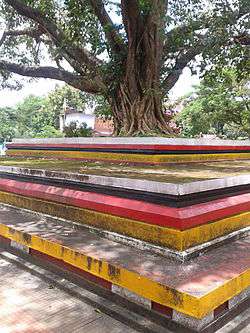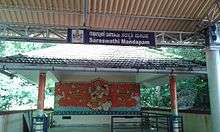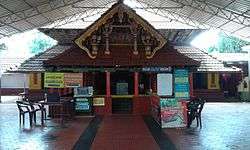Madayi Kavu

| Madayikkavu ಮಾಡಾಯಿಕ್ಕಾವು | |
|---|---|
|
Tiruvarkkadu Bhagavathy Temple | |
| Name | |
| Other names | Madayi Kavu |
| Proper name | Tiruvarkkadu Bhagavathy Temple |
| Devanagari | तिरुवर्कड़ भगवती क्षेत्रं |
| Malayalam | തിരുവർക്കാട് ഭഗവതി ക്ഷേത്രം |
| Geography | |
| Coordinates | 12°2′4.99″N 75°15′41.14″E / 12.0347194°N 75.2614278°ECoordinates: 12°2′4.99″N 75°15′41.14″E / 12.0347194°N 75.2614278°E |
| State | Kerala |
| District | Kannur |
| Location | Pazhayangadi, Kannur |
| Culture | |
| Primary deity | Bhadrakali |
| Architecture | |
| Architectural styles | Traditional Kerala style |
| Number of temples | 4 Sanctums |
| History and governance | |
| Creator | Parashurama, Chirakkal Kingdom |
| Temple board | Malabar Devaswom Board[1] |
Thiruvarkadu Bhagavathi Temple (Aka: Madayi Kavu), is the mother temple of all Bhadrakali shrines of North Kerala. The deity is the Fierce form of Bhadrakali. The Bhagavathy is addressed by tantrics in the vicinity as Tiruvarkkad Achchi due to this. The temple administration is Malabar Devaswom Board. The temple is a revered shrine of Chirakkal Royal Family and a shrine of Chirakkal devaswom before. The temple, situated in Madayi, Payangadi, hence prominently known as Madayi Kavu.
Etymology
The temple is addressed as Thiruvarkkadu Bhagavathy, Thiruvar-in proto-Tamil-Manipravalam is used to address Shiva of the shrine, i.e. The most respectable one. The temple architecture of some shrines in the region shows how the Goddess is perceived in the region. The temples such as Annapoorneshwari temple and Madayikkavu has strong Brahminic influence. The Brahmin women in ancient time, were not allowed to show their faces in the sit-out, they were mostly inside their home and was addressed as Andarjanam by Kerala Brahmins. The Goddess is considered as Brahmin Mother and hence do not face the temple entrance gate, her sanctum is inside the shrine; the sanctum that we can see while entering from the front entrance is of Shiva(Also due to the tantric temple architecture Rurujith Vidhanam) and in Annapoorneshwari Temple it is Krishna's shrine in the front entrance. So the temple is known by the name of Shiva rather than the Goddess. Tiruvarkaadu means The forest of the Lord.[2]
Legend
There are different folklore about the origin of the temple. One of the legend says, The Bhagavathy, Madayikkavilamma was residing in the Rajarajeshwara Temple. But, as she was non-vegetarian she could not exist in the Shiva temple. She ordered the then King of that region to construct a separate shrine for her.

In another legend, long ago Madayi was troubled by a demon Darika and Madayikavilamma killed him and requested Shiva to enshrine in a temple near him. Lord Shiva ordered his disciple Parashuram to consecrate a shrine for the Shakti. Parashurama created the Madayippara and the Holy shrine on it.[1] The shrine is considered the last resort for the removal of Occult Sorcery(Black Magic and Witchcraft).
History
During the incursion of Hyder Ali into Malabar, followers of the Islamists army had destroyed nearby temples (including Vadukunnu Shiva Temple). Circa 1780, Madayi Kavu was desecrated with the entrails of slaughtered cattle, following which a local Nair warrior named Vengayil Chathukutty beheaded the miscreant responsible for the act, delivering the severed head to temple authorities. Thereby the Nair family of Vengayil received the title of Nayanar.[3]
Worship
Kattumadom Esanan Namboothirippad is the Tantri (Head Priest) of the shrine. Kattumadom is one of the 4 major Mantravada clan of Brahmin families in Kerala.[4] The priests at the temple belong to the Podavar Brahmin community which allows meat and alcohol consumption.
The temple rites are in Koula sampradaya. The ability to control Ashtapaashas (Eight chains)- (Ghrina (Hatered), Lajjaa (Shame),Bhaya (Fear), Shanka(Doubt), Jugupsa(Reproach), Kula(caste), Jaati(creed) and Sheela (Modesty), is key for meditation especially in Koula Sampradaya. If a devotee is able to control these, The Bhagavathy raises our consciousness to Shivam.[5] The major festival of the temple is Pooram in March. There are also festivals in the Malayalam months of Thulam, Vrishchikam and Makaram in addition to the Pooram in Meenam. The Perumkaliyattam is in the Malayalam month of Idavam.[6] The temple is also associated with the Bhadrakali temple of Mannanpurathu Kavu (Nileshwaram) and Vadukunnu Shiva Temple.
The Shiva shrine faces East, while the Bhadrakali shrine faces towards the West. The priests at the temple even though Brahmins are not Namboothiris, they are Pidarar Brahmins, belong to a particular sect associated with Kali worship, and are not barred from consumption of meat. A particular aspect of the temple is Kozhi Kalasham, which is the sacrifice of poultry for the goddess which is held in high regard.[7][8]
Access
The national highway passes through Taliparamba town. Goa and Mumbai can be accessed on the northern side and Cochin and Thiruvananthapuram can be accessed on the southern side. The road to the east of Iritty connects to Mysore and Bangalore. The nearest railway station is Pazhayangadi on Mangalore-Palakkad line. Trains are available to almost all parts of India subject to advance booking over the internet. There are airports at Mangalore and Calicut. Both of them are international airports but direct flights are available only to Middle Eastern countries.
See also
References
- 1 2 "Temples under Malabar Devaswam Board, Division : Thalassery" (PDF). Malabar Devaswam Board. Retrieved 10 August 2013.
- ↑ "Thayi paradevata". Retrieved 18 August 2013.
- ↑ "MadayiKavu". Sachindranath P V (Unofficial site). Retrieved 18 August 2013.
- ↑ ""Manthravaadam" (Conjuration / Sorcery)". namboothiri.com. Retrieved 14 August 2013.
- ↑ "The Ashta Paasha (8 chains)". Retrieved 18 August 2013.
- ↑ "Madayi Kavu". Retrieved 18 August 2013.
- ↑ http://www.hindupedia.com/en/Madayi_Kavu_Bhagwathi_temple
- ↑ http://commentjar.blogspot.in/2011/03/madayi-kavu.html
External links
| Wikimedia Commons has media related to Madayi Kavu. |

